0
-
An empty cart
You have no item in your shopping cart
Looking for a way to bump up your protein intake? Think nuts and seeds!
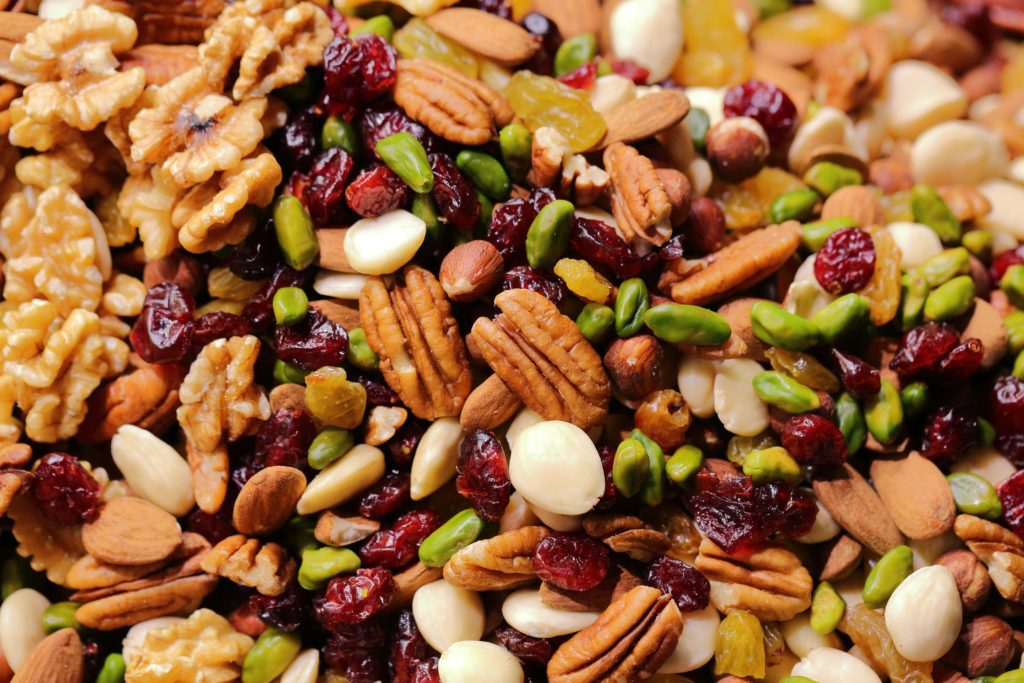
With the New Year in full swing, you may find focusing on better quality protein intake to be an easy health goal. It can help you look better and feel better. Protein is one of the three macronutrients (the other two being carbs and fats). Protein can come from both animal and plant foods. When you eat protein, it’s broken down into amino acids in your body. There are two main types of amino acids: non-essential, which your body makes on its own, and essential, which you must get from the food you eat.
Dietary guidelines for Americans recommend you get between 10% and 35% of your daily calories from protein, depending on your age, sex, and kidney health. Getting enough protein daily can help you feel full, keep your blood sugar more stable, and maintain your lean body mass, but that’s not all. Protein is important in building muscle and providing structure to hair, skin and bones, transporting oxygen throughout the body, hormone balance, and supporting body processes including digestion. One great way to ensure you’re eating sufficient quality protein and other nutrients is to include a variety of nuts and seeds in your meals.
“Nuts and seeds offer more than just protein,” says Lisa LaCross, registered dietitian MS,RD and co-owner of Whole Balance Nutrition, LLP.
“All too often I see my clients wanting to add in nutrition via powders and pills with the intention of getting all of their vitamins and minerals. Nutritional supplements are just that, supplements. Often our body can’t absorb and utilize a lot of the nutrition inside those supplements. I always advise my clients to get their macro and micronutrients from whole foods first, and supplement only when necessary. Nuts and seeds are a wonderful way to get some of those vitamins and minerals that could be missing from our ultra processed world.”
Nuts and seeds are packed with antioxidants, vitamins and minerals, which play various roles in supporting overall health, from supporting the immune system to skin health. Nuts and seeds are more than just delicious snacks and salad toppers. Get ready to up your protein intake and take advantage of all the health benefits nuts and seeds have to offer. Take a look at our list of the ten best varieties, plus some easy tasty recipes you can make.
1. Hemp Seeds
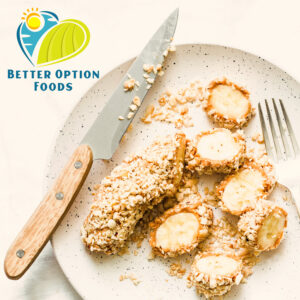
Hemp Hearts on Banana Bite
Protein: 10 grams in 3 tablespoons (30 grams)
When it comes to protein, hemp seeds are the star of the show! This tiny but mighty seed is an excellent choice; not only is it plant base, but it carries all 20 amino acids. Hemp seeds offer up a whopping 10 grams of plant protein in 3 tablespoons, plus anti-inflammatory and essential fatty acids (omega fats). They’re full of nutrition including magnesium. According to Lisa, “Magnesium supplementation is having a moment right now. I advocate for whole foods first.” Hemp seeds offer 300 mg of Magnesium that’s 79% of the RDA in one 30 g serving! Magnesium is needed for healthy muscles, nerves, and bones. Hemp seeds are an excellent supply of iron, which oxygenates blood and helps to regulate blood sugar. They’re heart-smart providing healthy fats and vitamin E and are an anti-inflammatory food source. Hemp seeds are easy to incorporate into your daily diet. Add 3 tablespoons to smoothies, oatmeal, steamed veggies, and salads.
Try our Hemp Banana Bites recipe – an easy nutritious snack for kids to enjoy!
2. Pumpkin Seeds
Protein: 8 grams per ounce (28 grams)
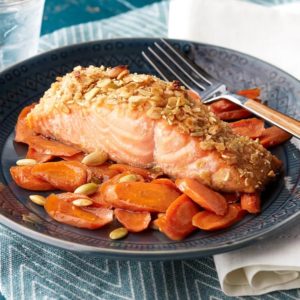
These flavorful seeds are another protein star with 8 grams of protein per ounce and may even help you have a restful night’s sleep since they’re high in magnesium and tryptophan. Lisa points out, “Pumpkin seeds are low in lectins and are a great option for my clients concerned with consuming a low lectin diet.” Maybe you’ve noticed recipes that call for Pepitas. Pumpkin seeds can be substituted for Pepitas, but technically they are different in that Pepitas are harvested from a specific hulless pumpkin variety, making them less fibrous and more tender.
Try our Pumpkin Seed Encrusted Salmon recipe!
3. Peanuts
Protein: 7 grams of protein per ounce (28 grams)
Peanuts are actually a legume, but we’re including them here because they’re full of amazing health benefits. A 2020 review published in Food Science and Human Wellness states peanuts can help you optimize cholesterol, triglycerides, and blood pressure numbers.
At 7 grams of protein per ounce, peanuts are a great source of protein when it comes to different nuts and seeds. However they’re an allergen food, which may be problematic for some people’s diet. Better Option Foods offers Soft and Chewy an easy no-bake protein bar mix, which you blend with peanut butter and honey. It’s simple and unlike a lot of protein bars on the market – you’ll recognize every ingredient! Additionally, if you do have a peanut allergy you can replace the nut butter in Soft and Chewy bars with the very next nut on our list. Use almond butter instead.
Try our Soft & Chewy Raw Protein Bar Mix!
4. Almonds
Protein: 6 grams of protein per ounce (28 grams)
If you’re looking for ways to improve your heart health, think almonds. They offer a good amount of protein, along with heart-healthy fats and vitamin E. Per Lisa, “Almonds are a great source of manganese, a lesser known mineral that is a vital for forming connective tissue, blood clotting factors, and bones.” One ounce of almonds provides about 6 grams of protein. While you can snack on raw almonds and toss slivered almonds onto a salad, don’t forget about the health benefits of baking with almond flour, which is also a gluten free alternative.
5. Sunflower Seeds
Protein: 6 grams of protein per ounce (28 grams)
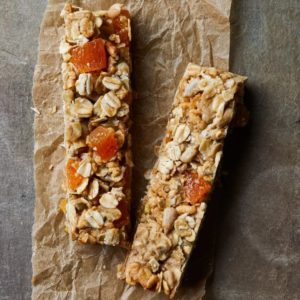
Not just for birds! According to Lisa, “In addition to protein, sunflower seeds are high in the mineral copper. Copper is vital for the maintenance of our immune systems and nerve cells, as well as making red blood cells.” Sunflower seeds have about 6 grams of protein per ounce, plus other nutrients, vitamins and minerals. They are often found in different nutrition bars and are a great addition to your favorite trail mix recipe. Speaking of bars, SuperSeed Protein Bar Mix is a super easy, no-bake bar mix with a healthy supply of sunflower seeds. Just add your favorite sweetener syrup. Stir together and place in the refrigerator – no baking required!
Try our Apricot Hemp Sunflower Granola Bar recipe!
6. Pistachios
Protein: 6 grams of protein per ounce (28 grams)
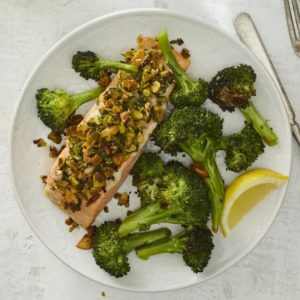
These little green nuts are a great source of protein containing 6 grams in each serving. They have a surprising benefit; they’re great for eye health. This nut stands out for its high levels of specific antioxidants that protect against macular degeneration and the harmful effects of blue light on the eyes. Lisa states, “Pistachios are also a great source of B6, a water-soluble vitamin important for normal brain functioning.” Boost your nutrition with this easy to prepare Roasted-Pistachio Crusted Salmon with Broccoli.
Try our Roasted Pistachio-Crusted Salmon with Broccoli recipe!
7. Cashews
Protein: 5 grams of protein per ounce (28 grams)
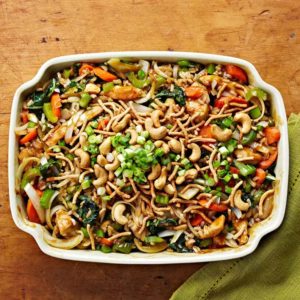
For an antioxidant boost, give cashews a try. Cashews have 5 grams of protein per ounce and also provide beneficial fiber and healthy fats. Similar to other nuts, cashews contain a significant amount of antioxidants which protect the body and cells from harmful substances. Lisa comments, “Although not as high in protein as other nuts, cashews are a great source of Magnesium, Manganese, and Copper! These nuts are mild and easily added to meals for additional vitamins and minerals.” This Garlic Cashew Chicken meal is a beautiful warm, Asian-inspired meal we’re sure you’ll love.
Try our Garlic Cashew Chicken Casserole recipe!
8. Flaxseeds
Protein: 5 grams per ounce (28 grams)
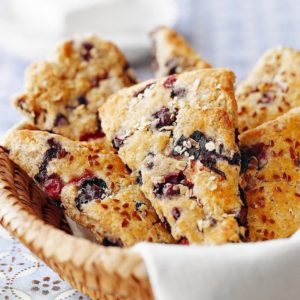
Flaxseeds can be added to smoothies for a boost of fiber and protein. Flaxseeds have about 5 grams of protein per ounce and are also high in fiber! There are almost 8 grams of fiber per ounce, plus they’re easy to store. Lisa points out, “Flaxseeds are a great source of vitamin B1 aka Thiamine, which is vital for the growth and development of cells. Only small amounts of B1 are stored in the liver, so daily intake is important!” If you’re looking for a sweet but healthy treat to enjoy with coffee or tea, bake up these delicious Blueberry Scones backed up with the power of Flaxseed and Whole Hemp Seeds.
Try our Blueberry Scone with Flax & Hemp Seeds recipe!
Looking for something you don’t have to bake? Try our no-bake SuperSeed Raw Protein Bars, complete with flaxseed in the blend!
9. Hazelnuts
Protein: 4 grams per ounce
Also called filberts, these hardy winter nuts are a little on the sweet side and are full of health benefits. With about 4 grams of protein per ounce, hazelnuts are packed with nutrients, including healthy fats, which may help to increase antioxidants and lower cholesterol. According to Lisa, “Hazelnuts are high in alpha-tocopherol, or commonly known as Vitamin E. Vitamin E has powerful antioxidant & anti-inflammatory qualities which can help prevent and reverse disease.” Although it’s best to eat hazelnuts whole and unroasted to ensure the highest concentration of antioxidants; roasting finely chopped hazelnuts and adding them to a delicious warm Brussels Sprout Salad during the winter months is an excellent comfort food high in nutrition.
10. Walnuts
Protein: 4 grams per ounce
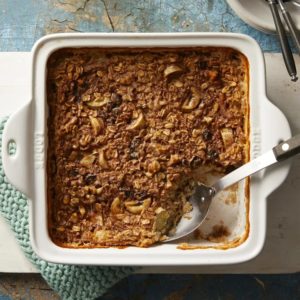
These nutrient-packed nuts have around 4 grams of protein per ounce, plus healthy fats and other nutrients. Can walnuts help our brain? A 2020 study published in Nutrients shows the nutrients in walnuts, particularly omega-3 fatty acids, have antioxidant and anti-inflammatory impacts which can have positive effects on cognitive function. Eating a handful of walnuts in the midafternoon can provide you with a nutritious heart-smart, brain-boosting snack. This baked oatmeal recipe is perfect to warm you up on a chilly morning.
Try our Baked Oatmeal & Walnuts recipe!
The Bottom Line
With the huge assortment of nuts and seeds available, you won’t get bored. There are endless ways to include them in your daily meals. Regularly including a variety of nuts and seeds can be simple and effective to ensure a wide range of beneficial nutrients. Above all, nuts and seeds are a great choice for quality protein.
Looking for help exploring lifestyle changes to feel your best? Lisa is a registered dietitian and owner of Whole Balance Nutrition in Lapeer. She is a wellness coach with Cross-Fit. Her goal is to help you emphasize LIFESYLE changes embracing Better Eating Options. Reach out to Lisa, MS RD for a personalized nutrition and fitness coaching program designed just for you!